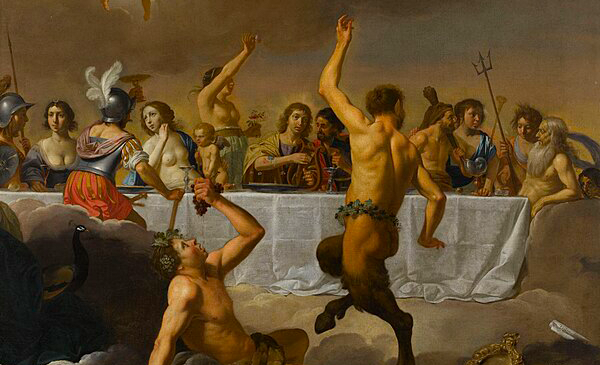Conservative commentators have been in an uproar over what they saw as a “woke” jab at Christianity by Olympics organizers.
The outcry has continued, despite art historians and classicists pointing out on social media the offending scene from the opening ceremony was not a tableau of Leonardo DaVinci’s Last Supper but was based on Jan Harmensz van Biljert’s 1635 painting, Feast of the Gods, which unlike the Last Supper, resides in France.
The overlooked or disregarded clue to the scene’s inspiration was French actor-singer Philippe Katerine, painted blue and dressed (or rather undressed) as Dionysus, the god of wine.
Functioning as a one-man Greek chorus, Katerine sang his song “Nu” (Nude), explaining to the fashion capital of the world why it’s better to be naked: “Where to hide a revolver when you’re completely naked? No more rich and poor when you go back to being naked.” It’s a cheeky song with a serious message about peace, equality and, according to the official Olympic Games account on X , “the absurdity of violence between human beings.”
No matter, politicians and religious leaders on the right have insisted on being insulted.
To believe this is a blasphemous attack on Christianity requires removing the tableau from all context, which is a trademark tactic of conservative firebrands. Whether it’s a verse plucked from its historical and textual environs to justify a homophobic, racist or sexist point of view or an anecdotal example of a crime committed by an immigrant to stoke xenophobic fear, the process is the same, and so are the aggrieved results.
By the way, data show the overall crime rate in America is down and immigrants commit fewer crimes than native-born Americans.
… falsehoods and false grievances such as the misinterpretation of the Olympic opening ceremony are fueling a resurgence of right-wing populism in Europe as well as the United States.
While those outside the right-wing media echo chamber roll their eyes and shake their heads at all this much ado about nothing, the frightening truth is falsehoods and false grievances such as the misinterpretation of the Olympic opening ceremony are fueling a resurgence of right-wing populism in Europe as well as the United States.
Continental Europe, overall, is more secular when compared to the United States, and leaders on the right there are not looking to establish a controlling Christian regime in the mold of Christian nationalism. However, right-wing populist politicians are framing their message in Christian identity and symbolism, especially when it comes to interracial tension over immigration from Muslim-majority countries.
“Christian,” then, is not so much a faith as it is a cultural and racial identifier, a way to define who “belongs” and who is the “other.”
Scandinavian countries have a reputation for liberality, but far-right parties in both Sweden and Finland have become major players in those countries’ parliaments.
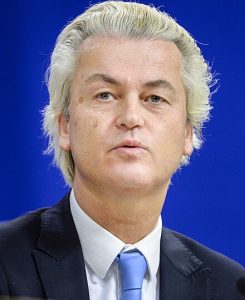
Geert Wilders (Photo/Wikipedia)
In Amsterdam, Geert Wilders, known as the “Dutch Donald Trump,” led his party to an astounding victory in the Netherlands on an anti-Islamic platform that vowed to halt asylum seekers and ban the Quran, Islamic schools and mosques. What were once fringe ideas are becoming more mainstream.
In Austria, the Freedom Party, founded by a former SS officer in 1956, dusted off its old Nazi jargon and touted Great Replacement Theory rhetoric to win its nation’s seats in the European Parliament. They hope to repeat their success in September during Austria’s election for its lower legislative house. While the European Parliament may not have robust governing powers, its composition is considered a reliable bellwether when tracking political trends on the continent.
Next door in Germany, the far-right Alternative for Germany seeks to restrict immigration, gay rights and abortion. Cofounder Alexander Gauland says he is not looking to defend Christianity out of any religious obligation, but because it is a “metaphor for the customs inherited from our fathers.” The party expects big wins this fall in the eastern states of Brandenburg, Saxony and Thuringia to mirror its victories last year in Bavaria.

Giorgia Meloni (Photo/Wikipedia)
Italy’s Prime Minister Georgia Meloni heads up the most far-right government since the days of Benito Mussolini in World War II. Meloni’s party, Fratelli d’Italia, has roots in the neo-fascist Movimento Sociale Italiano. Matteo Salvini, the leader of Italy’s far-right League party and the nation’s deputy prime minister, said of the opening ceremony tableau, “Opening the Olympics by insulting billions of Christians around the world was a really bad start, dear French.” Salvini is currently on trial for his callous treatment of refugees rescued in the Mediterranean.
In France itself, Marine Le Pen, who inherited the leadership of that country’s right-wing party, the National Rally — formerly the National Front — from her father, Jean-Marie Le Pen, has transformed the National Rally from a fringe movement to a force to be reckoned with. The elder Le Pen was known for his outspoken antisemitism and trivializing the Holocaust.
During her time in leadership, Marine Le Pen has worked to soften the party’s image and appeal to younger voters. This appeal has been spearheaded by Le Pen’s protégé, Jordan Bardella, age 28, who is the current president of the party. The National Rally has made further inroads channeling some of its antisemitism into Islamophobia.
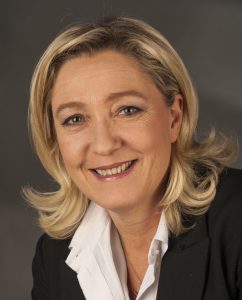
Marine Le Pen (Photo/Wikipedia0
The National Rally wants to end birthright citizenship and bar “French people of foreign origin” from certain government jobs. This would be unconstitutional in France, a country which does not distinguish between being French by birth and dual citizenship.
Julien Odoul, the spokesman for the National Rally, called the Olympic opening ceremony “woke.” She and Le Pen’s ultra-conservative niece, Marion Maréchal, both derided the inclusion of singer Aya Nakamura. Although she is the most listened-to French singer in the world, Nakamura was born in Mali and grew up in the suburbs of Paris. Noticeably, the two did not make the same complaint about French-Canadian Celine Dion’s participation.
In addition to anti-immigrant sentiment, the rise in support for the National Rally has brought with it a rise in anti-LGBTQ hate crime. A government report showed a 13% jump in anti-LGBTQ offenses in 2023, compared to 2022. Violent crime against LGBTQ people in France rose 19%. The party has consistently voted against LGBTQ legislation at home and in the European Parliament.
The National Rally’s victory during round one of the French parliamentary election sent shockwaves through Europe.
This summer, the National Rally’s victory during round one of the French parliamentary election sent shockwaves through Europe. Neighboring democracies wondered what an empowered Bardella or Le Pen would mean for France.
Would a country known as a strong proponent of human rights and the home of “liberté, égalité, fraternité” succumb to authoritarianism? And how would the ascendancy of a party funded by a €9 million loan from the Kremlin affect Europe and the world at large?
To counter the advance of the National Rally and stop its “France First” agenda, several left-leaning parties and the centrist president of France, Emmanuel Macron, coalesced to create a “republican front.” The Communist Party, the Green Party and the radical France Unbowed put aside their differences and merged into the New Popular Front.
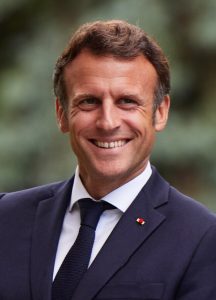
Emmanuel Macron (Photo/Wikipedia)
Macron then withdrew some of his party’s candidates who weren’t expected to win in the second round of voting. A narrowed field had the effect of concentrating votes rather than diluting them among many parties. Head-to-head contests also highlighted the extreme views of National Rally candidates like Ludivine Daoudi, who was forced to withdraw when social media posts surfaced of him wearing a Nazi cap.
Working together, the centrist and leftist parties in France defeated the National Rally, at least for the moment. The National Rally still won more seats than in past elections, and the far right continues to assert its influence in France and across Europe.
Here in the United Kingdom, although the Labour Party won an overwhelming victory against the Tories, support for Brexit-backer Nigel Farage’s populist and more extreme Reform Party is growing. If Labour is unable to deliver on its promises to fix the National Health Service and the economy, desperate Brits are likely to throw their lot in with a radical right. Farage has already stated his real focus is on 2029 and beyond.
The 2024 Olympic opening ceremony was in many ways a celebration of France’s near miss with right-wing political control. Philippe Katerine said he was “proud” of his controversial performance: “It’s my culture. We’re full of different people, and everyone lives their own way and, above all, has the right to do so. I loved doing it.”
However, the kind of righteous indignation over a seeming afront to Christianity that erupted in the wake of the performance is just what those on the extreme right in Europe want to help fuel their revival of fascism. Political and religious leaders in America weighing in and throwing gasoline on the fire only aid and abet their cause.
Which raises the question: What, if anything, can be done? Is there a way to stem what seems to be an inevitable rise of a right-wing populist tide?
As it happens, a German scholar’s research shows there is a way — and it involves churches.
In a webinar for the Council on Foreign Relations, Oxford University’s Tobias Cremer said his research revealed: “In many European countries, by openly and vehemently speaking out against the populist right, churches have really significantly raised the social costs of association with these parties among church members, (and created) a religious vaccination effect, by really making it somewhat socially unacceptable to vote for these parties.”
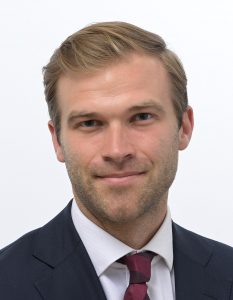
Tobias Cremer (Photo/Wikipedia)
He found a quite different effect in the United States, where church leaders are unwilling to make supporting populism taboo. In America, he says, “we see this vaccination effect disappearing or even reversing,” meaning American churches are enabling and even empowering right-wing populism rather than slowing it.
This, he says, is due to American churches’ acceptance of the merger of the religious right with the “identarian right,” defined as those who identify with a cultural Christianity but do not regularly practice the tenants of Christianity. Cremer published his findings last year in his book, The Godless Crusade: Religion, Populism and Right-Wing Identity Politics in the West.
Cremer, whose great-great grandfather was part of the Confessing Church and was executed by the Nazis alongside Dietrich Bonhoeffer, said in Germany the Catholic Church has positioned itself against Alternative for Germany. Several of its bishops have joined demonstrations against extremism. The church also has disinvited right-wing politicians from church events and removed them from church councils.
In France, Pope Francis’ advocacy for refugees and against far-right politics has had a noticeable impact, causing support for National Rally to decline among church-attending French Catholics.
Furthermore, Protestant denominations in Germany are teaching clergy how to push back against right-wing populism. Protestant advocacy during the French election also made a difference. The Protestant Federation of France, representing more than 500 communities, organizations and movements from several denominations, encouraged voters to choose democracy and to protect the country’s most vulnerable citizens.
“Living one’s faith in the world engages our responsibility to work together and individually for the common good,” a federation statement said. “Listening to the gospel necessarily has political consequences that oppose the Rassemblement national’s (National Rally’s) program.”
Encountering resistance from denominations and churches has forced Europe’s populist parties to adjust their messages, says Cremer. “The Alternative for Germany …, initially they really went out, ‘We are the real defenders of the Christian West. We are the real defenders of Christian Germany, et cetera, et cetera.’” After being publicly rebuffed by the Catholic Church, the Alternative for Germany has now become very anti-church.
Cremer encourages clergy to be confident, both inside and outside the church, when confronting political movements that are misappropriating Christian identity. Even more important, he says, is addressing the root of the problem — isolation and the disintegration of traditional sources of identity.
“I think if you actually say religion can be a source of an inclusive and transcendent identity that cuts across races, for instance, that could be incredibly powerful and, in many ways, a real ally against this right-wing populist movement,” he said.
Kristen Thomason is a freelance writer with a background in media studies and production. She has worked with national and international religious organizations and for public television. Currently based in Scotland, she has organized worship arts at churches in Metro D.C. and Toronto. In addition to writing for Baptist News Global, Kristen blogs on matters of faith and social justice at viaexmachina.com.
Related articles:
The post-evangelical phenomenon is in Europe, too
This is how quickly one can become a refugee
The two men behind the possible schism in the Church of England

